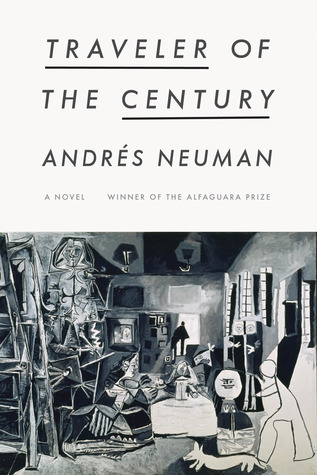
What are your favorite works in translation? That's the question that launches this summer's NBCC Reads series, which draws upon the bookish passions of NBCC members and honorees. (Previous NBCC Reads series dating back to 2007 here.) Tell us why you love the book (in 500 words or less) be it a new one, like Sayaka Murata’s quirky little novel, 'Convenience Store Woman,' or something a bit older, such as Stefan Zweig’s evocative memoir, 'The World of Yesterday.' The deadline is August 3, 2018. Please email your submission to NBCC Board member Lori Feathers: lori@interabangbooks.com
Andrés Neuman’s fourth novel, and his first to appear in English, is a novel of ideas with big things to say about Romanticism, early modern Europe and the emancipation of women, among other things. But Traveler of the Century’s most abiding fascination is with the act of literary translation, which it likens to passionate, revelatory sex.
Take, for example, the following passage. Hans is an itinerant man of letters, lingering in the curious town of Wandernburg, somewhere between Prussia and Saxony, on his way back from Napoleonic France. Sophie is the percipient hostess of a local literary salon, a feminist intellectual ahead of her time who, unfortunately, also happens to be engaged to a local bigwig. Together, they blur linguistic and corporeal intercourse:
During the four hours they spent alone three times a week, Hans and Sophie alternated between books and bed, bed and books, exploring one another in words and reading one another’s bodies. Thus, inadvertently, they developed a shared language, rewriting what they read, translating one another mutually. The more they worked together, the more similarities they discovered between love and translation, understanding a person and translating a text, retelling a poem in a different language and putting into words what the other was feeling.
The pleasures of translation, like those of sex, are contingent; ephemeral; imperfect:
Both exercises were as happy as they were incomplete–doubts always remained, words that needed changing, missed nuances. They were both aware of the impossibility of achieving transparency as lovers and as translators…And yet at the same time the bridges between the languages, between them, became broader and broader.
Working words from one language into another is frequently awkward, and where poetry is concerned, unavoidably messy. But for Neuman, such qualities are not a turn-off, but rather virtues to be celebrated. His descriptions of Hans and Sophie (translated from the Spanish with obvious thoughtfulness by Nick Caistor and Lorenza Garcia) celebrate the flaws of the lovers’ bodies: jiggly flesh; odd moles; stray hairs; brackish odors. It’s all part of the fun.
Neuman’s broader project here has everything to do with the breaking down of boundaries: between individuals; between cultures; between the past and the present; and especially, between languages. Amid descriptions of the lovers’ naked flesh there are explicit references to Goethe’s concept of Weltliteratur, with its dream of a universalized body of literature capable of eclipsing more narrowly nationalistic forms of creative expression. And despite the resistance such radical ideas inevitably attracts–the couple faces opposition from Sophie’s traditionalist father and her boorish fiancé, as well as hostile Wandernburg provincialism–Traveler of the Century remains powerfully optimistic about translation’s ability to breach barriers and salve isolation.
For those of us drawn to literature in translation, and all of the various intimacies and freedoms it promises, this is irresistibly potent stuff.

